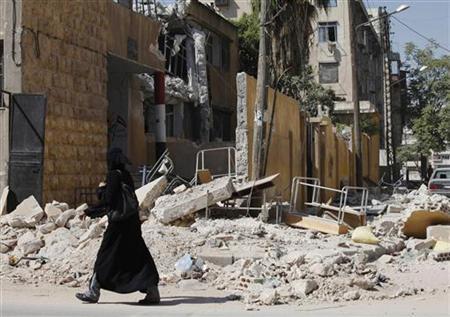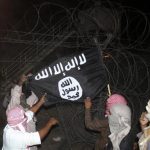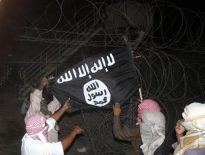(Reuters) – France may be considering arming Syria’s rebels but the U.S. and other Western powers have yet to find opposition figures they genuinely trust as they worry over growing jihadi and sectarian forces.

The attack on the U.S. consulate in Libya’s Benghazi that killed its ambassador and anti-American demonstrations elsewhere this week over an obscure video that ridiculed the Prophet Mohammad might have no Syria links but will make nervous governments even more cautious.
Western officials say there is little doubt a growing number of foreign jihadi fighters are entering the fray, although it is far from clear whether any have direct links to Al Qaeda. But It is just one worry amongst many.
“This is not a situation where the U.S. can do much to shape what happens,” says Mona Yacoubian, a former State Department official and now fellow and Syria expert at the Stimson Centre. “There has always been a lot of caution within the Obama Administration on Syria and if anything things are getting more complicated.”
Working with Libya’s initially notoriously disorganized rebels, officials complained, was hard enough; but the opposition to Syrian President Bashar al Assad seems even more diffuse.
That makes policy-making much more complicated and supplying weapons, or even choosing who to talk to, more of a gamble.
“We badly need to identify some political and military leaders who can make clear that they seek a political settlement to bring all fighting to an end,” said one Western official on condition of anonymity. “Without that the blood letting reinforces the worst aspects of sectarianism and makes a soft landing ever less likely.”
Western states have been on a concerted offensive to push opposition figures towards greater unity, facilitating meetings that range from foreign-based conferences to Internet chats and small border gatherings.
But, beyond pushing in humanitarian aid they fear there is a limited amount they can do to change the situation on the ground.
“It’s a very difficult situation, and the lack of coherence of the opposition is probably the biggest single challenge,” says Melissa Dalton, a senior Pentagon adviser on Syria and the Middle East currently on sabbatical as a visiting fellow at the Centre for New American Security.
“Given everything that is at stake, the United States clearly cannot do nothing. But there are no good scenarios arising from this conflict, and so the most important strategy for the United States to pursue is mitigating the risks to its interests.”
That meant to prioritize tracking Syria’s chemical weapons, ensuring militant groups inspired by Al Qaeda were unable to set up safe havens and preventing weapons from falling into the wrong hands, she said. It also meant avoiding doing anything to make matters worse.
DITCHING SNC FOR FSA
Current and former Western officials say their countries have lost confidence in the Syrian National Council (SNC), the largely foreign-based body initially courted as a government in waiting. With some of its meetings dissolving into fisticuffs, it is increasingly both too chaotic, too sectarian and simply lacking in a significant support.
The main focus of political and diplomatic effort, they say, is now the Free Syrian Army (FSA), particularly as its fighters prove increasingly successful at ousting Assad’s forces from significant portions of the country. But even the FSA, they worry, may be a unified body in little more than name.
After a sluggish start, Turkey, Saudi Arabia and Qatar have been overseeing cross border movements from a secret liaison center in Turkey. Ankara denies any direct involvement in channeling of arms across the frontier. U.N. diplomats say Saudi Arabia and Qatar have been transferring weapons to rebels.
Western states have so far restricted themselves to “nonlethal” support such as body armor, radios and medical equipment although a French diplomatic source said early this month that Paris was considering giving heavy weaponry.
Those with knowledge of events say the United States and other Western intelligence agencies are already trying to vet those receiving arms channeled across the Turkish border. Should France choose to supply arms, it could expect warnings from Washington if it dealt with those about whom the U.S. had concern.
But knowing conclusively who anyone is along the chaotic border, experts say, can be all but impossible.
In principle, the FSA remains commanded by former Syrian force colonel Rian al-Assad, an early defector who first announced the rebel group’s existence to the world more than a year ago. But in reality, there are growing suspicions that his influence and that of the rest of the group’s leadership may be collapsing on the ground.
Kept cloistered by their Turkish military hosts, some Syria experts say the FSA’s headquarters now amounts to little more than a media center. The real emerging power bases seem to be within Syria, particularly in cities such as Aleppo and Idlib where Assad’s forces have ceded some ground.
“CHAOTIC FREE FOR ALL”
“Every group is sending people (separately) to Turkey to ask for weapons,” says Joseph Holliday, a former U.S. Army intelligence officer and Syria expert now a fellow at the Institute for the Study of War in Washington DC, describing the situation as a “free for all””. “Countries, organizations or just wealthy individuals are talking to these individual groups and giving what support they want to people that they want.”
Dealing with so many players was itself a challenge for organizations such as the U.S. State Department more used to working on a national level, he said.
Some groups are already accused of reprisal killings, a worrying sign for foreign powers who believe agreement with some of the minority Alawite regime may ultimately prove vital.
Any offer of lethal support, some argue, should bring with it signed assurances of commitment to a peaceful post-war transition. But holding the rebels to account afterwards might prove impossible.
In a potential sign of further escalation, France, which has a colonial history in Syria and showed itself in Libya to be an increasingly assertive Mediterranean power, has also voiced support for a Turkish suggestion of militarily protected “humanitarian zones”.
But as well as worries that any such action would simply further inflame the situation, the United States in particular worries that even enforcing a no-fly zone could require it to move forces currently arrayed against Iran.
Washington is also unpleasantly aware that as things stand, any such move would be in the face of angry Russian and probably also Chinese opposition – as well as one of the most militarily challenging battles of recent decades. The downing of a Turkish jet earlier this year showed Assad retained a sophisticated air defense system.
The opposition, however, says Western reticence is already costing lives. Last week in Istanbul, two senior Aleppo rebels accused the outside world of simply watching “like a movie” while thousands died.
“There’s a lot of frustration with the West,” says former U.S. Army intelligence officer Holliday “they think we encouraged them to rise up and then didn’t do anything to support them.”
(Reporting By Peter Apps)





